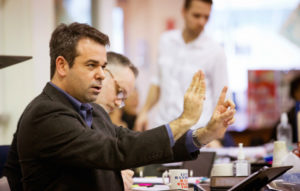
Q & A: General Director Tomer Zvulun On The Atlanta Opera’s 2018-19 Season
By David SalazarThe Atlanta Opera is on the upswing and becoming one of the most exciting opera companies in America. This is best evidenced by the company’s upcoming 2018-19 season which will feature an assortment of modern and classic works.
The opera’s growth and expansiveness could be directly attributed to the man in charge, Tomer Zvulun, whose reforms to the company since taking over as its General Director have seen its profile and audience grow in spades.
OperaWire had a chance to recently talk to Zvulun about the company’s 2018-19 season, the General Director providing an in-depth look at his choices and how they all come together to create a greater thematic whole.
OperaWire: You talk about setting up your seasons around themes. What would you call the general theme of the season?
Tomer Zvulun: The overarching idea behind the season – both mainstage and Discoveries – is something very powerful that Oscar Wilde says in “Salomé,” that the mystery of love is greater than the mystery of death. In general, opera is about sex and death. But each and every one of the operas we are presenting this season is about the idea of love, and the different kinds of love that transcend the mystery of death.
OW: Let’s dive right into talking about each work you picked for the season. Leonard Bernstein’s centennial celebration has been a big part of many season announcements, and unsurprisingly you have not overlooked this at all. Surprisingly, however, you went in a different direction with the repertory choice. Instead of “Candide,” which is what everyone’s doing or done, you go with “West Side Story.”
TZ: We wanted to do a Bernstein piece that was not done before. So it seemed that for the 100 years anniversary, we wanted to do “West Side Story.” So there is this new production that is making a bunch of stops, including Atlanta Opera directed by Francesca Zambella. And she is making her debut with us as well, which will be exciting.
”West Side Story” is so relevant to our time. The themes: immigration, violence, social and economical inequality, xenophobia are all issues that we read about everyday in the papers in 2018. What makes ”West Side Story” so special is the underlying message of unity and OW: Let’s take a step back a month. The season kicks off with “Charlie Parker’s Yardbird.” Tell me about that choice and what will make it an important selection for Atlanta’s new season.
TZ: It’s going to be special. It has always been performed in a proscenium theater. We’re commissioning a new orchestration so that it can be performed in an immersive jazz club.
OW: You also have a couple of repertory classics this season in “La Traviata” and “Eugene Onegin.” Why did you pick these operas?
TZ: “Onegin” wasn’t done for 15 years in Atlanta and we were involved in this co-production with Seattle, Detroit, and Kansas City. It’s a gorgeous production that Stephen Lord is conducting. And “La Traviata” is a co-production with Washington Opera, and it will mark the American debut of a Czech soprano Zuzana Marková. She is making huge waves in Europe.
OW: You don’t usually backtrack in terms of repertoire, but this season you are reviving “Maria De Buenos Aires,” which you did a few seasons back. What was the decision behind that?
TZ: “Maria” was such a hit here. It was supposed to be just three performances, but it was sold out so quickly that we had to add extra performances. And there were so many people that weren’t able to see it that time that we decided to bring it back.
OW: What do you think was the major factor that attributed to this opera’s success, even though it is not one of the major repertory staples?
TZ: I think it’s a combination of things. First, the idea of a tango opera is appealing to audience. The second part is the location, which is the Red Velvet Cabaret. And the third thing is the word of mouth. During my time with Atlanta, I’ve come to learn that word of mouth works like gangbusters here. If people here about a good show, they will be there. We sell out immediately. That was evident with “Maria” and “Out of Darkness.” We didn’t sell a lot of tickets in advance of “Out of Darkness,” but once people started seeing the show and seeing the reviews, we started selling out the performances.
OW: Speaking of “Out of Darkness,” a Jake Heggie opera is also on the slate for this season, the second straight year you program one of the composer’s works. What inspires you about his operas?
TZ: This is the first time that Jake Heggie is programmed on the main stage for us. It’s a co-production with the Israeli Opera and once it’s done here it will travel to Israel and become the first American opera to ever be performed there. I love his work because he is a man of the theater. I have already directed three of his pieces and very few people understand theater the way Jake understands theater. HIs music is powerful, dramatic, and melodic. Audiences respond to it remarkably, which is evidenced by the fact that “Dead Man Walking” is the most performed American opera of the 21st century. There are about 70 or 80 cities that have programmed it or set it up for future seasons. I don’t want Atlanta to lag behind.


